Fungal cellulase is an elicitor but its enzymatic activity is not required for its elicitor activity
- PMID: 24844544
- PMCID: PMC6638370
- DOI: 10.1111/mpp.12156
Fungal cellulase is an elicitor but its enzymatic activity is not required for its elicitor activity
Abstract
Plant-pathogenic fungi produce cellulases. However, little information is available on cellulase as an elicitor in plant-pathogen interactions. Here, an endocellulase (EG1) was isolated from Rhizoctonia solani. It contains a putative protein of 227 amino acids with a signal peptide and a family-45 glycosyl hydrolase domain. Its aspartic acid (Asp) residue at position 32 was changed to alanine (Ala), resulting in full loss of its catalytic activity. Wild-type and mutated forms of the endoglucanase were expressed in yeast and purified to homogeneity. The purified wild-type and mutant forms induced cell death in maize, tobacco and Arabidopsis leaves, and the transcription of three defence marker genes in maize and tobacco and 10 genes related to defence responses in maize. Moreover, they also induced the accumulation of reactive oxygen species (ROS), medium alkalinization, Ca(2+) accumulation and ethylene biosynthesis of suspension-cultured tobacco cells. Similarly, production of the EG1 wild-type and mutated forms in tobacco induced cell death using the Potato virus X (PVX) expression system. In vivo, expression of EG1 was also related to cell death during infection of maize by R. solani. These results provide direct evidence that the endoglucanase is an elicitor, but its enzymatic activity is not required for its elicitor activity.
Keywords: Rhizoctonia solani; elicitor; fungal cellulase.
© 2014 BSPP AND JOHN WILEY & SONS LTD.
Figures

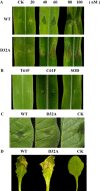
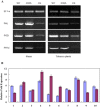
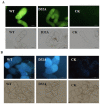

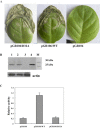
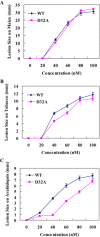


References
-
- Ahuja, I. , Kissen, R. and Bones, A.M. (2012) Phytoalexins in defense against pathogens. Trends Plant Sci. 17, 73–90. - PubMed
-
- Angelova, Z. , Georgiev, S. and Roos, W. (2006) Elicitation of plants. Biotechnol. Biotechnol. Equip. 20, 72–83.
-
- Annis, S.L. and Goodwin, P.H. (1997) Recent advances in the molecular genetics of plant cell wall‐degrading enzymes produced by plant pathogenic fungi. Eur. J. Plant Pathol. 103, 1–14.
-
- Ausubel, F.M. (2005) Are innate immune signaling pathways in plants and animals conserved? Nat. Immunol. 6, 973–979. - PubMed
Publication types
MeSH terms
Substances
Associated data
- Actions
- Actions
- Actions
- Actions
- Actions
- Actions
LinkOut - more resources
Full Text Sources
Other Literature Sources
Miscellaneous

